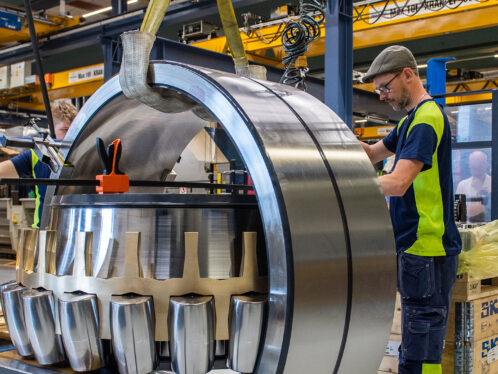
Jack Welch
Furious for innovationPatience does not figure high in the list of qualities that make Jack Welch a fine businessman. “If something bothers you,” he’s been known to say, “yell at it. Kick it. Scream at it. Break it!”
It is that type of furious impatience with resistance that characterises the 63-year-old John Francis Welch Jr., chairman and chief executive officer of General Electric. The kind of glowing creativity that cuts through hierarchies, breaks down corporate barriers and violates the chain of command.
But Welch combines creative fury with a boundless belief in individual creativity. “The idea flow from the human spirit is absolutely unlimited,” Welch once told a Business Week reporter. “All you have to do is to tap into that well. It’s creativity. It’s a belief that every person counts.” Welch turns his subordinates into leaders by tapping their creativity.
Welch’s personal style seems carved from his beliefs. The squat, muscular man with the sharp Boston accent would seem like anything but a great executive. Yet Welch moves with surprising speed, jumps right to the point, fixes his auditor with his laser-blue eyes, and says a great deal with the few words he chooses. Associates say that he is one of the most focused speakers they have ever heard.
Certainly Welch has succeeded in focusing G.E., in breaking down its corporate barriers and in obtaining the best from his employees. The company has delivered extraordinary growth, going from a market value of 12 billion U.S. dollars in 1981 to about $280 billion 1998. The G.E. that Welch has built is a business empire with $90.8 billion in sales all around the world. “No one has created more shareholder value than Jack Welch,” says Prudential Securities analyst Nicholas Heymann, who predicts that the company could be worth $500 billion by 2000.
“Jack Welch is one of the greatest corporate leaders of the century,” says Noel Tichy, a professor of management at the University of Michigan. “He established a new, contemporary paradigm for the corporation that is the model for the 21st century.”
The man who has achieved all this forged his determination early. He came from the wrong side of the tracks in the small, heavily industrialised city of Salem, Massachusetts. His father, John Sr., was a conductor for the Boston & Maine Railroad.
Welch went to Pickering Elementary and then on to Salem High School where he was captain of the hockey team and golf team, and then on to the University of Massachusetts. After earning a Ph.D. in chemical engineering at the University of Illinois, he chose a position at G.E. in 1960 out of three job offers, because he wanted to be close to home.
After a year, Welch was ready to leave, feeling stifled by the company bureaucracy, by management’s failure to entertain new ideas. Born in 1892, G.E. had tried to be all things electrical, from toasters and hair dryers to jet engines, many of them tough, cyclical, low-margin businesses. “As managers in those days,” says Dennis Dammerman, G.E.’s chief financial officer, “we were reminded incessantly that we were ‘ stewards’ of whatever department, division, business or product line we ran, some of which were relics that dated back to the era of Thomas Edison. We were heavily layered and enormously bureaucratic.”
Welch’s boss convinced him to stay, and made him the head of the newly created plastics division, which he was to start from scratch. He quickly earned the reputation of a maverick. “Welch and his team in the plastics business were regarded as wild men and bomb throwers,” Dammerman says. “They felt no need to be ‘ stewards’ of anything.” Welch at one time actually blew up the laboratory he’d been given at the division, but he quickly converted it into one of the most profitable at the company.
It did not take long for Welch to work his way up the corporate ladder. He became vice president in 1972, senior vice president in 1977 and vice chairman in 1979, before becoming G.E.’s youngest-ever chairman and CEO in 1981.
Furious for innovationPatience does not figure high in the list of qualities that make Jack Welch a fine businessman. “If something bothers you,” he’s been known to say, “yell at it. Kick it. Scream at it. Break it!”
It is that type of furious impatience with resistance that characterises the 63-year-old John Francis Welch Jr., chairman and chief executive officer of General Electric. The kind of glowing creativity that cuts through hierarchies, breaks down corporate barriers and violates the chain of command.
But Welch combines creative fury with a boundless belief in individual creativity. “The idea flow from the human spirit is absolutely unlimited,” Welch once told a Business Week reporter. “All you have to do is to tap into that well. It’s creativity. It’s a belief that every person counts.” Welch turns his subordinates into leaders by tapping their creativity.
Welch’s personal style seems carved from his beliefs. The squat, muscular man with the sharp Boston accent would seem like anything but a great executive. Yet Welch moves with surprising speed, jumps right to the point, fixes his auditor with his laser-blue eyes, and says a great deal with the few words he chooses. Associates say that he is one of the most focused speakers they have ever heard.
Certainly Welch has succeeded in focusing G.E., in breaking down its corporate barriers and in obtaining the best from his employees. The company has delivered extraordinary growth, going from a market value of 12 billion U.S. dollars in 1981 to about $280 billion 1998. The G.E. that Welch has built is a business empire with $90.8 billion in sales all around the world. “No one has created more shareholder value than Jack Welch,” says Prudential Securities analyst Nicholas Heymann, who predicts that the company could be worth $500 billion by 2000.
“Jack Welch is one of the greatest corporate leaders of the century,” says Noel Tichy, a professor of management at the University of Michigan. “He established a new, contemporary paradigm for the corporation that is the model for the 21st century.”
The man who has achieved all this forged his determination early. He came from the wrong side of the tracks in the small, heavily industrialised city of Salem, Massachusetts. His father, John Sr., was a conductor for the Boston & Maine Railroad.
Welch went to Pickering Elementary and then on to Salem High School where he was captain of the hockey team and golf team, and then on to the University of Massachusetts. After earning a Ph.D. in chemical engineering at the University of Illinois, he chose a position at G.E. in 1960 out of three job offers, because he wanted to be close to home.
After a year, Welch was ready to leave, feeling stifled by the company bureaucracy, by management’s failure to entertain new ideas. Born in 1892, G.E. had tried to be all things electrical, from toasters and hair dryers to jet engines, many of them tough, cyclical, low-margin businesses. “As managers in those days,” says Dennis Dammerman, G.E.’s chief financial officer, “we were reminded incessantly that we were ‘ stewards’ of whatever department, division, business or product line we ran, some of which were relics that dated back to the era of Thomas Edison. We were heavily layered and enormously bureaucratic.”
Welch’s boss convinced him to stay, and made him the head of the newly created plastics division, which he was to start from scratch. He quickly earned the reputation of a maverick. “Welch and his team in the plastics business were regarded as wild men and bomb throwers,” Dammerman says. “They felt no need to be ‘ stewards’ of anything.” Welch at one time actually blew up the laboratory he’d been given at the division, but he quickly converted it into one of the most profitable at the company.
It did not take long for Welch to work his way up the corporate ladder. He became vice president in 1972, senior vice president in 1977 and vice chairman in 1979, before becoming G.E.’s youngest-ever chairman and CEO in 1981.
Welch’s success came from finding those businesses in the elephantine conglomerate that had growth potential. “I had the luxury of being an insider who ran high-growth businesses like plastics, or saw opportunities in wonderful things like G.E. Capital, and then had big, bureaucratic, hundred-year-old businesses reporting to me. I saw businesses that were No. 5 in the marketplace, not even No. 3, that we were holding onto as a shrine to our past,” Welch said in a speech last year.
Ignoring G.E. tradition, he sold off businesses where he did not think there was growth potential. In seven years, he succeeded in reducing G.E.’s workforce by 100,000. To acquire the right mix, Welch bought and sold scores of businesses, acquiring in the process companies as diverse as the NBC television network and the financial services firm Kidder Peabody.
Welch focused G.E. around 12 businesses that he thought would generate shareholder value. And then he pressed his employees continually for leadership that would provide that value. “Take a look at what a refrigerator cost 15 years ago, and take a look at what an automobile cost 15 years ago,” Welch said in a Fortune interview. “A refrigerator sells for just about the same price as 15 years ago. An automobile is 22 times [more expensive], or whatever it is. We’ve had to fight in competitive industries like that every day and grow margins and grow returns. Our price index for the last seven years is probably negative as a company, and yet our profits have grown at double-digit rates. That comes from using capital more efficiently, using people more efficiently, from systems behaviour.” With G.E. focused on the 12 core businesses, Welch began taking G.E. global in the late 1980s. He moved aggressively into Europe, which now accounts for more than $20 billion in turnover. He began making inroads in Asia as well.
Then, in the 1990s, Welch began moving G.E. into high-tech services, which is where he sees the company’s future. Already, G.E. Capital, the financial services arm of the company, had enjoyed rapid growth. But Welch is expanding the company’s offer in such areas as telephone support and satellite monitoring.
To ensure success in these diverse sectors, Welch devotes much of his time to creating leaders to manage them. Each quarter he gathers his top executives at the leadership development centre in Croton-on-Hudson, New York. Here the company’s goals are set. “The G.E. leader knows what this company is: the largest petri dish in the world for innovation,” Welch says.
Welch has committed himself to retiring in 2000. But before ending his career, Welch has been able to enjoy the success of yet another great reform at G.E.: the Six Sigma quality-assurance programme. The name refers to the Greek letter sigma, a term used in statistics to signify variation. Launched in 1995, Six Sigma is devoted to eliminating defects from production in either manufacturing or services. Welch is investing millions in training and quality control to raise the “Sigma level” at the company. So far, his investment has paid off in thousands of suggestions for cost savings and process improvement. The benefits are already estimated at US$750 million. “Six Sigma is transforming everything we do,” Welch says proudly.
But there is little doubt that Welch will continue to make changes at G.E. until the arrival of 2000 obliges him to stop. Probably nothing else could.
Andrew Rosenbaum
a business journalist based in London
photos General Electric




